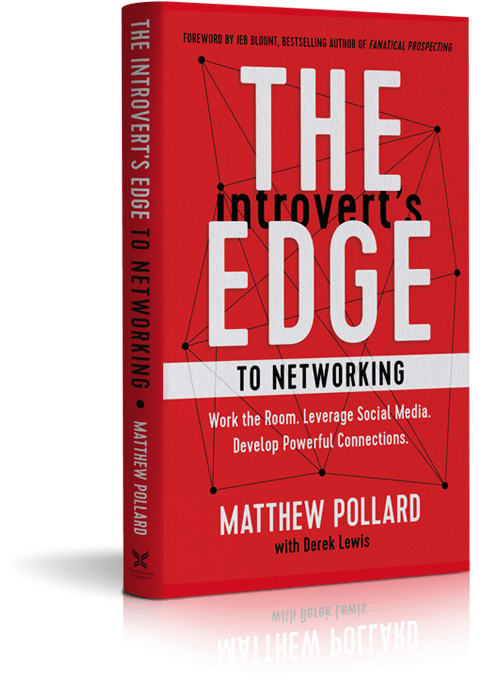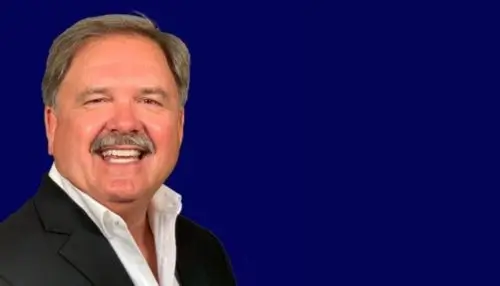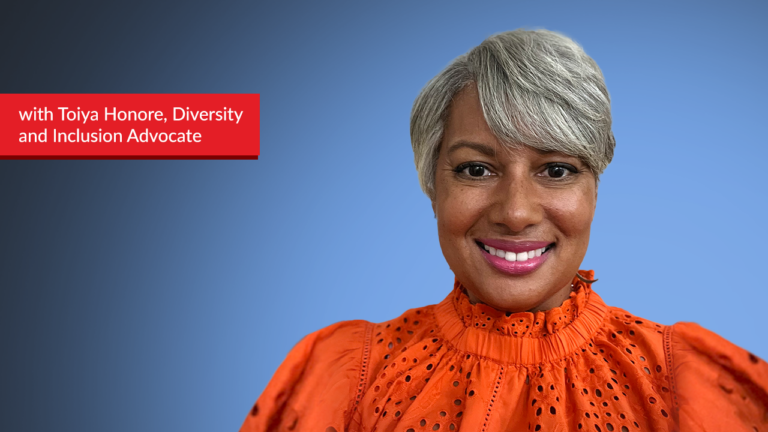Creating Business Enterprises as an INTJ Entrepreneur
Matthew Pollard: Hello everyone, and welcome to the Introverts Edge podcast. And I have to say I’m ecstatic about this next interview. You’re going to say that this guy is going to echo a ton of some of the things that I’ve already told you. He just is going to tell you in a much more effective way, at least I hope you will.
And I will say this is a one of the rarest breeds of introverts. You will find he is an INTJ. And what that means is that you will well, you will learn that like a lot of remarkable entrepreneurs, he has almost a scientific approach, yet you will find out that he has mastered the art of selling and public speaking. And as a matter of fact, that is what he chooses to do for a living.
So for those people that haven’t heard me enough to say that introverts are amazing speakers and they’re amazing salespeople, you are going to hear somebody that also at the age of 19 was the best salesperson in the company of 44 offices that Go went on to sell a ridiculous number of houses, 17 houses in one month, which, by the way, in real estate, that’s not usually possible.
So you’re going to hear how he went about doing that. He started a whole bunch of businesses. He’s had four bestselling books, as you can tell, he’s an underachiever. And if you if that’s not enough, he has got a podcast called The Proven Entrepreneur that only only has a couple of thousand five star reviews. So as if this is starting to sound like this guy is in an interview, an into an introvert, I want to promise you that it is.
As a matter of fact, on his website he outwardly says that, which I’m ecstatic about. But Don Williams, welcome to the show, mate. I’m ecstatic to have you.
Don Williams: Matthew, thank you so much. I counted as a high honor to be your guest today.
Matthew Pollard: Well, you know what’s funny? I spent more time than I would ever actually getting ready for your introduction. And the reason being is it is such a diverse set of things. And, you know, a lot of entrepreneurs, they hear that and they they think to themselves, oh, that’s that’s how you become successful. You just scattering. You do a whole bunch of different things all at the same time.
And I know that, you know, for a lot of the people that have been successful, they fixate and focus on just one thing. So I want to come back to the very beginning because you are birthed in sales and yet you outwardly say you’re an introvert. You outwardly say that you’ve always been an introvert, which, by the way, for those people listening, you can’t change who you are.
It’s just what you draw your energy. But I want to really take us back to to early dawn, and I want you to kind of tell me tell me when you felt that you were introvert, did you did you always have that word for it? It was a light of discovery. And how did that then lead to jumping into sales? Go, I can do this.
From Quiet Kid to Renowned Business Owner
Don Williams: Great question. And so and and funny answer. So I was raised in a household with both my parents. My parents are still married today. And so I was blessed with that. And my father was a United States Marine. My mother was a stay home mom, so I had a very dominant father and I was a quiet kid. And so I’d speak if you, you know, made me feel a question.
I was fearful. Other than that, I was content to observe, which I think that’s probably common with introverts. And about age 11 or 12, I began to be interested in half of the population. I began being interested in girls, but I couldn’t talk to girls. And so I was like, Oh, there’s someone on these comedy shows that’s on television, you know, the guy, he can’t talk to girls, and that’s funny.
Well, it’s not funny for the guy. It’s not funny at all. And so I read a book. My dad was in Life insurance on the side, and I read a book of his How to Win Friends and Influence people. And I was maybe 11 or 12. And I, I believed that girls are people, too. And I’d like to win some girls, so I’d like to influence some girls.
And so I read that book for the first time at 11 or 12. And to me it’s like book one or one of human relations start there. And I don’t care if you’re 80. If you ever read the book, I’ll get the book. It’s about 100 years old or 90 years old, But timeless principles. And and I knew then that I always knew I was kind of shy and kind of quiet and and I’m I’m still today kind of shy.
I’m not very quiet anymore, but I’m just I’m just a loud introvert. I still prefer to be I’m very happy in the company of myself. And that recharges my batteries. And I think we’ve talked about this before, even at events where I will go and speak, I won’t talk to anybody that day. I will not talk to my wife because I want to show up on stage with all of my energy, all of my ammunition, and then I’m going to lay it.
I’ll leave it all on the stage and I’ll save a little bit for handshakes and hugs and the after party, so to speak. But then I’m going to want to be alone.
Matthew Pollard: That’s that’s interesting. And one of the things I’m noticing as I’m talking to you and it’s funny, you have this same approach and it’s interesting you get to introverts, the talk that are enjoying the same topic, and you would swear that they’re both extroverted, right? Because you and I banter. We have great fun.
Just before this, we were talking because, you know, I’m going to be on your podcast tomorrow and and you talk about how I’m going to need the weekend to recover, but yet I ask you this question and I was and this comes a lot with my planning and preparation, and I’ve always been excited to do these types of interviews so my energy levels go up and of course I’m an Australian, so I tend to speak a little bit faster and yet most people wouldn’t feel comfortable interacting and doing what you just did. So I want to pay specific attention to it. One was you slowed the conversation down and you felt comfortable with pregnant pauses. And for a lot of introverts, they feel and I’m just going to call this out because people I believe that people would have heard you do that and said, this person’s an authority, they’re comfortable in their own space.
Yet for a lot of introverts that would have received the question that I just gave them, they would have felt that they needed to match my intensity and perhaps that’s not their natural, authentic way of of communicating that it’s mine, but it doesn’t necessarily mean it’s theirs. Was that something you’ve always done or always felt comfortable doing, or is that something you’ve had to learn over time to be comfortable to do?
Communication Skills of Successful Entrepreneurs
Don Williams: Great question. I think I’ve always said, and maybe this is true of introverts, you probably know this better than me, but I’ve always felt like I was different. Sometimes that was positive and not that I’ve always felt that I was different and I’ve been and selling words are my friends, and so I’ve been in selling right books. I have a podcast.
Nothing makes me happier than to give me a microphone and point me at a stage. Tell me to go talk. Words are my friends, but I think after a career, my delivery, because I think speaking rests on two pillars content and delivery. There are some speakers have unbelievable content, but their delivery is so bad nobody can listen to them.
There are other people whose content is totally empty now. Their delivery is phenomenal, but neither one of those will inspire anybody to actually go do something. And in selling or in leadership or at this point in my life, I really only want to work with people who are going to learn. And do people that just want to learn.
God love them. But but I don’t have enough time to invest in those people. I want to invest and people want to learn to do. And so I think my my communication style has morphed and evolved. And if I lived to be 150, I’ll perfector I don’t think that’s possible, but it would take me that long to probably get it there.
But I think I’ve always been a good communicator. I thought it was going to be a baseball player. I love baseball. My my father did not think that was going to happen. And it turns out he was right. But I can remember in high school or I came and I lived in a very authoritarian house in it in a different time and world for kids to live in.
And if you did, you didn’t share them. And so I remember going in high school, Dad said, Now you’re going to take debate cause like, I’m not going to be not well, I took the bait and that dinner turned out I was a pretty good debater. And so I think selling and I think leadership, you know, is clear communication with a little bit of persuasion.
And I think most people in selling are like, oh, no, it’s it’s all this persuasion and manipulation and NLP. And I’m like, I think all that comes into play. But I think most people don’t buy because they never really understood what the offer was. You never made it clear that I’m going to give you this, this and this in return for this small amount of money to where I’m going to present it in a way that you’re going to throw your money at me.
Because what I’m giving you, you know, if if I’m going to sell you a $300,000 Lamborghini brand new off the showroom floor, $400,000. So if I sell it to you for 300, so 3,000% to you for 300,000, it’s a nice car. It’s a 300,000 car, but there’s no real value in there. But if you let me buy the $300,000 car for $100,000, that 200, that’s value.
And when you present your product, service or experience where that value is magnified, so it gets really easy. People just buy me virtually, take my money, give me that, give me that.
Do Extroverts Sell the Same Way as Introverts Sell?
Matthew Pollard: I’m with you on that. I think for a lot of people and I don’t want all of your videos you talk about sales is actually really, really hard if you’re doing it wrong. But when you do it right, it’s actually kind of easy. And I’m a big advocate of sales process and I know you are as well. I, I kind of learned the hard way.
I fell into digital sales and I went, Oh my gosh, $93 for my first sale. I’m not doing that again. I need to find a smarter way of doing this and learn by watching YouTube videos. I’m interested in how how you found sales methodology. Is it that you’ve always been I mean, your I mean, your Myers-Briggs profile says by nature I’m scientific and I follow process.
But a lot of I work with a lot of engineers that follow process in everything they do. But when it comes to sales, they’re like, Oh, I’ve got to we get like those extroverts. So when you first started in sales, did you naturally go, Oh, I need to do a sales process that nobody was talking about that I mean, no one was talking about it when I was 19.
When you were 19, I’m assuming it was there was far less people sharing that and people pushing the door to a salesperson to want to wing it. How did you find your way? Well, firstly, how did you find your way into sales and then how did you find your way into sales? Systematic process.
Don Williams: Great questions. So when I graduated high school, before I entered college was about a three month timeframe here in the States. I went to work for a meatpacking company. So if you ever saw the movie Rocky where he’s pounding on the sides of beef, I worked in a place where they had the sides of beef and they cut steaks, roasts, etc. and a friend of mine had a door to door sales job, which I commend you for doing that, and even more for knocking on the 93rd door, because that that took some it took some took some moxie.
And I mean, that just took some guts to do that. So I had a friend who was selling Fuller Brush, which I don’t even know if they’re available in business anymore, but they basically sold kitchen cleaners and tools door to door. And he called me one day and I forget he had made six or $700. This would have been in 1978, in a week, which was about three times what I was making working at a meatpacking plant.
And so I said, Do they need help? He said, I think so. I went and interviewed. They hired me and their sales training was with a sales rep for three presentations and and the sales rep I sat with. He did not make a sale. And on the fourth presentation of that, I asked him, I was like, Hey, I think I have enough.
I think I understand enough of it. Can I, can I present? And if I make the sale, it’ll be your sale. I just want to do the talk. Well, I made the sale and, and so they, when I went for my this was pre-interview, when I went for my interview, they said, we don’t want to hire you, but you already made a sale, and so we’ll have to hire you.
I was like, okay, I’m 18 years old. What do I know? And and I would say early on, because the national average for closing percentage in that business was about a third, which for most companies that would be rare error. That would be very, very good. Mine was almost double that. I was in the low 60 Hz and people would say, How do you do that?
I’m like, I don’t know really. I know that people like to buy from me and I know that I let them. I try and not do anything to keep them from buying from me. And I said if I had any secret at all, I would say I’m very, very sincere and brutally honest and brutal honesty is so rare it would just shock people into buying from you.
Authenticity: The Power to Potentially Revolutionize Industries
People are so used to salespeople painting Blue sky. This will cure cancer and hunger or world peace if you just buy my thing and nobody believes it, the prospect doesn’t believe it. They don’t believe it. But if you’re just brutally honest, you’ll sell more of whatever you sell. And I think today they would call it authenticity, not sincerity.
But I also think this whatever you were going to sell, I think there’s three primary objections and a million secondary and tertiary. But the three primary are number one is trust. So feel good enough about you or it and I’m just not doing it. How many times the prospect doesn’t even know. But that’s what it is. If you if you could get them to quiet down, then access no money and then no time.
And that covers about 99% of all objections. And the trust thing to me is about 90% of it. If people can trust you, they want to buy from you. And I get clients and people, you know, after I talk, they’re like, Well, how do I build trust? What, man, you’re not going to like this? Answer Be trustworthy. You know, there’s there’s not some magic formula.
It’s like, do what you’re going to say. Say what you’re going to do. Keep every promise, you know, make big, bold promises and then overdeliver and it would just shock. People will literally just fall out of their chair. They’re so used to being let down by their own team, their own staff, their own family, their own friends. You know that when you come through, when Matthew Matthew told me, I’m taking it to the bank, when you have that kind of trust established, people will you find that they’ll throw their money at you?
I mean, the throw their money at me business? I don’t want to be in the selling league. I want to be in the delivery way too much value.
Matthew Pollard: What’s really interesting about that, Don, is I find that most people that I hear and I actually prefer the word sincere than the word authentic, because I find that lots of people will say, I don’t want to be that slimy salesperson because I need to be authentic. And I personally believe that the best way to sell I mean, it’s the word sales is actually derived from the Scandinavian term to serve.
So I believe the best way to sell is to serve your clients, whether new and innovative products or something that’s been around forever. And I like the concept of being sincere because the best way to serve your clients is sincerely giving them something that adds value and you know, quite frequently from stage I when I’m doing sales kick offs, like if you got a product that doesn’t benefit your clients, stop selling, don’t use any of the stuff I’m about to teach you because I don’t want to help you not serve.
But if you truly believe that what you do serves and betters the person you’re talking to, if you’re creating groundbreaking products and services, stop doing that extroverted dance. Stop painting the sky blue. Stop telling them all these fairy stories that they won’t treat as trustworthy and get down to brass tacks. And if you have to tell them, this will not work for you if you do not make this change, and if that is difficult, you need to know that and you need to agree to move forward anyway.
Otherwise, stop telling yourself a lie that you want this outcome right. Just be okay with where you at, right? You’re not starving. You’re living in a nice house. Move on. Just move forward with your life and stop telling yourself that you want this thing. And sometimes people struggle with that because they’ve heard that in sales they have to talk about themselves, talk about their product, and it’s all I And then introverts do like that.
So because of that, they try to be authentic and their authentic self feels that they need to educate a client, which just overwhelms them with a firehose of information which stops them buying any way. And what I’ve seen in a lot of your content is you say, stop doing all of that and understand. Stand where the customer is from their point of view and whether it’s sales, whether it’s building a world class team, whether it’s delighting your customers, it’s picking yourself up out of this place.
That introvert. I don’t understand why they want to be there, but they go there for when they’re trying to sell and putting yourself in the customer’s shoes and then sincerely speaking to their needs, their wants and their fears. How do you in your I mean, because you’ve come so many people, how do you get people out of this I centric into this understanding of the other person and getting back to sincerity.
Don Williams: And I love that. So if I can make one comment first, then I’ll answer that. So if you’re not selling something that you know, the value of your product or service experience far outweighs the dollars you’re asking for, please quit and find something that does because you’ll never you’ll never reach the heights you could and should reach. If you sell something that is of questionable value.
I believe so much in what I do that your money will be worthless to you compared to what I’m going to give you. And that’s how you build a value proposition. Okay, so second off, question Time again, Matthew, I’m sorry I lost my train.
Matthew Pollard: The question really was, how do you get people from that selfish? I to moving in to that sincerity in the other person’s shoes?
New Ideas About Bias
Don Williams: Love that. And so here’s kind of my thoughts on perspective or point of view in your relationship with your wife, in your relationship with your children and your relationship with your friends, your teammates, your prospects in your relationship with the world. You have a perspective, you have a way. You see things. Okay? And some people take this word as negative.
It’s not. It’s a neutral word. Bias. How you see things is your bias. It’s not doesn’t mean it’s negative. It doesn’t mean prejudice. That’s a different word. Bias just means here’s how I see things. Your wife, your kids, your family, your friends, your teammates, your prospects. They have a different point of view. They have a different bias. They came from a different place.
They’ve experience different things. They see things different. And that’s known as perspective or point of view between in the two. When it comes to influence, that could be leadership, that can be sales between the two. Only one of them has any importance and it ain’t yours, it’s theirs. And so if you really want to have significant influence with other people, it’s not advisable.
It’s mandatory. You must see things from their point of view and it’s not it’s not easy necessarily. That can take some practice, but it’s as simple as this. So when I came to this podcast today, I told myself, What can I deliver for Matthew to make this the best podcast in history? Now that’s pretty big. Pretty big. I’m probably not going to get there, but it is my goal.
Okay? And if I have a really high goal, I miss it. I still get somewhere. And if you have a low goal and you will see you got nowhere. So on perspective, you have to be a dolt and be a realist. That my natural self wants to see things from my point of view, but my high performing self knows that I must see things from your point of view.
Matthew Pollard: I think that’s really valuable. I, I feel that introverts have a real strength of this as long as they let go of their want to serve everybody or they’re feeling that they need to sell to everyone. I wish we had time to get more into to marketing because people shouldn’t be selling to everyone and their product doesn’t serve everyone equally.
But instead I want to I want to go more deeply into the reasons why. Why introverts firstly have an advantage because I believe that our ability to empathize does put out put us in the person’s shoes much easier if we let ourselves. But I do also think when we’re selling into our negative self-talk, it’s the concepts of we need to get this person to buy and they’re not going to take me seriously and I don’t know enough and I don’t want to be salesy.
Innovative Solutions to Negative Self Talk
That kind of gets in our way of being real, authentic, sincere people and actually being able to serve those clients. So I’m sure you’ve dealt with many an introvert with negative self-talk around the concept of selling and not wanting to feel icky to their disadvantage and to their client’s disadvantage to those people that aren’t getting past that psychological barrier to put themselves in their customers shoes, what advice would you give them?
Don Williams: Man And we talked about this a little offline and you mentioned negative self-talk. I think I replied something like, I’ve heard of that fight. I, I don’t have that, but I have I have heard of that. But, but I would say the US there is a book, there’s a series of books written by a guy by the name of Og Mandino, and the one that I’m thinking of in particular is a book called The Greatest Miracle in the World.
And the and the thesis of the book is basically this leading up to your conception where where you were born, where you were, where you were not before, and the sperm penetrated the egg, and now you are going to be okay. So some people might say that is your actual birth. All I know is you weren’t you were nothing before the intersection of the two.
You are something at that point, mathematically and physiologically, one of 400 million people could have been started. But it was, you. Now that’s longer odds than the lottery. And so when you realize that depending on your faith system, your belief system, whether God or the universe or whatever, when you realize there are really no accidents.
Og’s book and I personally believe this you are the greatest miracle on the planet. And once you realize that, I mean, like if we’re in selling, I mean, what’s the worst thing that can happen? They say no. And in my first sales job, 40 some offices, the policy of the company was about ten salespeople in office. 10 to 12 probably.
But the bottom person on the last on closing of the last day of the month got fired every month, making it worse. How long you’ve been there? Okay. And they didn’t even fire you. You just knew. Don’t come back because we were heartbreakers and life takers.
Matthew Pollard: Yeah, that’s the Enron world, right? Everybody lost bottom, people. All gone. All gone.
Don Williams: Absolutely. Absolutely. And so. So like the worse, worst, worst thing that can happen is you’d lose your job. Okay, well, that’s not great, but it’s not cancer. It’s not. I got hit by a truck. Okay? And so the worst thing that can happen for most salespeople is somebody tells you now and you got to keep in mind, I’ve sold billions of dollars of product services and experiences and by me are not I didn’t always get the order, but people that I were coaching did.
And and we did billions for G.E. real estate alone. I mean, that was just crazy. But it was a big, big, big ticket. But but the thing is, is this if if you if you have a case of negative self-talk, here’s a takeaway. Please find five or ten positive affirmations to offset that self-talk. Print them out, write them down, and every morning start out with I actually am a really good person.
I actually believe in this product. I actually want the best for other people and begin working on your mindset because that’s all it is. That kind of like readers gives a good reader, bad reader, and I’m like, They’re trained or untrained. Same thing on mindset. There’s people that are trained on how to manage their mindset and there are people that their mindset is managing them.
And so number, number one skill is to get in control of your mindset.
The Most Important Contributor to Self Confidence
Matthew Pollard: I think there’s nothing more important than mindset, and I see a lot of people that go into sales and their mind is not ready to sell. And I understand the rejection thing. I mean, Brian Tracy talks about that people perceive rejection the same as getting spanked as a child. And I, I don’t feel that way. I but I understand the connection because it’s that imagined pain.
But I prefer, again, my number one rule in sales and networking is that it’s not about me, it’s about the customer. I feel that everything you’ve said highlights the exact same thing. So I tend to focus on imagining what the customers life is like if I don’t close the deal and how much hotter it is and how good tenus to go.
You know, what fights are they having that they needn’t of? If I was able to sell what struggles are they having? You know what not, you know, bouncing them out of bed in the morning and getting hotter and hotter and what’s keeping them up at night? And if I focus on that, then I almost feel like sometimes I’m in a sale and the customers in their own way.
And that’s the way I look at it. And I feel like I have to do an intervention if I have to. Fine. Even if they don’t buy from me. And I feel that that is is liberating. But it comes from a a place of care. And I think that really comes back to, to your words, sincerity. It’s if I sincerely believe that their life is this fortune is going to be less fortunate because I don’t sell to them, then I owe it to them to then sell.
And if bought, to be able to think that way, you’re 100% correct. We’ve got to stop beating ourselves up. And I see so many introverts say they hammer themselves on everything that goes wrong and then anything that goes correctly deals. Oh yeah, yeah, of course that was going to happen. And they don’t give themselves any success. And then you start suggesting affirmations and they’re like, Well, I don’t want to be full of myself.
I don’t want to. And I’m like, You spending so much time beating yourself up, at least give yourself some credit to those people that that are uncomfortable with the concept of of affirmations and getting to that point of of saying all these things that are positive about themselves, what would you do to confront them with the reality you in everything that you write, It’s all about giving the honest truth.
What honest truth would you give people that are like, I don’t feel comfortable. It’s a waste of time. It’s it’s not something that I feel comfortable doing. What would you say?
Successful Entrepreneurs Play Outside Their Comfort Zones
Don Williams: I’d take a big breath and I’d give a big sigh like I just did. And I would say this Here’s what I know. And this is straight out of the book of Don. Here’s what I know about comfort zone physics. I love my comfort zone. You love your comfort zone. We all love our comfort zones. Why? It’s comfortable.
It’s like my favorite chair, you know, I like you travel a lot. I have met many strange pillows in my lifetime. Like many, I have a favorite one and it’s on my bed. That’s my comfort zone. But here’s what I know about comfort zone physics. If I step out of my comfort zone into my uncomfortable, my desk comfortable, my not comfortable zone, you know what happens?
My comfort zone expands and I step out the next time and it expands and I step out the next time and it expands out and so on and so forth. And at a certain point, you realize that your goal is to get out of your comfort zone as far and as fast as often as you can. Okay? Because that’s where your potential and that’s where your growth exists.
And so for the person who says, I’m not comfortable doing affirmations, I say, good, do it anyway. Okay? And it’s not important that, you know, I think many times we forget we’re going to get beat with one end of the stick or the other. I think salespeople and certainly junior salespeople psychologically die a little bit with every now.
And that’s a little over exaggeration. But if you’re a salesperson, you know exactly what I’m talking about. And by the same token, you can get six no’s in a row, or what Matthew’s case, 92, which means he was really persistent or not very intelligent. Just kidding. Refuge’s very.
Matthew Pollard: I don’t know why I did that.
Don Williams: Well, but but my point is this You get six no’s die a little bit beyond mental emotional life support. At that point, make one sale and it’s like you’re totally rejuvenated. You’re totally resurrected. Okay, I’m king of the hill. And then and then look at people like people like Michael Jordan. Okay, So and you pull it up on Google.
You know, Michael made, I don’t know, 30,000 points or whatever. Okay. But he missed like 50,000 shots. Okay. And some of the people who hit big numbers now, all the people who hit big numbers, they took a lot of swings. They shot a lot of shots. Okay. And and their mindset didn’t let that death be more than just discomfort.
And I would tell you this, if somebody doesn’t buy from me today, I still I don’t like it. Okay. I don’t like it more because something you said, Matthew, I know they’re not going to enjoy the benefit they would have had from my product service or experience. So, you know, I do sales and sales process consulting and I’m really, really expensive.
But if you look at it a different way, I’m totally free because sites have a client and I’m doing some of this on social media right now, I’m posting client wins, so I’m bragging on my client and that kind of trickles down, you know, to me. But I have one client that and they’ve done these events before and the record is about a hundred sales in the first 72 hours.
For three days we did 325 sales over 1500 dollars each. In a industry with 30 years experience and we tripled the best that’s ever been done. And so I’ve had a lot of people call say, How did you do that? I’m like, Man, we asked a lot of people to buy, and we asked them in a really smart manner.
And so they did. And if I have to be honest, my goal was to sell 500. So while we hit this pinnacle that nobody’s ever done before, and I get my goal, my goal is to sell 500. We sold 325, the best ever been done before, 100. Okay, But manage that mindset. Get out of your comfort zone. Good gosh.
Having Strong Self Confidence in Your Service and Value
Matthew Pollard: We you know, I think that what you just said is really interesting because anything that I do, I like to see myself as a profit center, not a cost center, like I know you and I both speak at events all the time. And I went, Well, I want to speak at Halo, and I’m more expensive to speak at events than a lot of the speakers that speak you know.
And I said, Well, how am I going to be a profit center for them? I know I’ll do membership drives because I believe in the product and I will therefore, you know, so sell from stage. I’ll do these videos to help them get people in and it’s congruent, authentic or in your words, sincere to me because I really wish I had that when I was growing up and starting a new business, my own businesses.
And while I was lucky enough to be very successful, I was also unlucky enough not to discover something like EOEor some form of association or group that I could really talk about, because everybody I knew thought I was really successful and they couldn’t teach me anything. And I, I missed having that. And it gave me that, that opportunity.
I think that everybody that’s listening, especially the small business owners, and I know that I have a large, small business audience, you always need it whether you’re a bookkeeper or accountant or to a ghostwriter, to a sales coach, to a business coach. You need to know the ROI that you’re giving your clients. And if you don’t know the ROI, go and ask them.
It blows me away how often I have to say, Well, tell me about your clients and the great results you get. What does that lead into? Our Why? I’ve got no idea. We’ll go find out. And then it’s much easier to understand a customer that you’re speaking to because they are in a situation and you’ve seen many, many times that you can be a profit center to them.
And because of that, they’ll feel much more comfortable. And this is this is all learned process. And I’m not saying to anyone that’s listening that you have to learn my process or you have to learn Don’s process. But it is important when you have a problem that you make a decision to learn how to fix it. And I know, Don, you’ve got a very I’m going to say, very sophisticated because you and I are very aligned on how to go about fixing fixing problems.
The “Google Search” Mistake in Addressing New Challenges
So I’m going to say it’s it’s an amazing, super sophisticated plan. But when people are presented with problems in business, in their careers, in leadership, right across the board, I tend to find that people say, I think this is my problem. And then they Google and the first three suggestions on Google, that’s their problem. Must be one of those three.
And then they buy something or go down that rabbit hole and fix it and fixate on that. And I feel that that’s ludicrous. And I know you do, too. So what advice would you give to people that perhaps have one problem, but actually it’s another? Or you know what their problem is, but want to stay in that as you said it, the comfort zone?
Don Williams: I’ll give you I’ll give you two opposing. It’s very similar answers. One, if I can hire Matthew for $1,000,000 and Matthew can deliver $10 million, 10 million margin dollars. So whatever my cost of goods that are my gross sales. But if he can deliver 10 million margin dollars. Matthew, you’re hired Now, most entrepreneurs, most salespeople, most business people will they’ll check out at the higher Matthew for $1,000,000.
They’re done, right? Absolutely not. I don’t care what he can do. But and so my point is, is this If you can hire a coach or a consultant or an advisor who can just give you the answers to the test, forget learning. It just I’m doing my Ph.D. in life. I, I don’t know the answer to these 17 questions.
I’m going to either have to pay through years of pain, fumbling around, or maybe I figure it out, or I can just give Matthew $1,000,000 and in 12 months I will get $10 million margin dollars. That’s crazy not to do that. I frankly, I don’t want to know everything at this point in my life. I am really zealous protector of what I let people put in my brain because I’ve been reading two books a week for 40 years.
Sometimes I’m 50 page Central book one I like. I read this book. Okay, So that’s one answer. Okay. If you can get somebody who can just give you the answers to the test, just cheat. It’s not cheating, though. It’s just being smart. Okay, So that’s one to give you three answers to explore everything you think, everything you can find, and then talk to people that are different than you and see what they have to say about it.
Explore all of the options. So Matthew and I are a lot of fun to hang together because we’re we both were we’re brothers from other mothers. I mean, we see so many things similar, though. His way of articulating and mine are a little different, but if you peel that part of the onion back, you’re like Abba. But it’s the same thing, perspective and point of view and mindset and on and on.
So you can’t really say you’ve explored all the options until you get people that are not anything like you because they’re going to see it. Remember that perspective thing, Their bias is going to be different. And if you play the game of opposites, this is a tough one, guys. This is like next level Jedi stuff, whatever you’re biased reaction is.
Ask yourself for a second, could the exact opposite be true? And if you’re like me, many times you’re going to be, Oh, it could be not, is it? I don’t know if it is yet at this point, but could it be true? And you’re going to find that it is. And so that’s going to tell you I got to get more people’s perspectives before I make decisions.
Okay. Now don’t get the paralysis analysis, get the information, make a decision, move on. Even if it’s wrong, you can always change your mind. The other thing I would tell you is this I’ve a really good friend here in Dallas. Rex Kersey is super smart guy and his first company, I think he exited for 10 million the next 125.
And I haven’t seen him in a while, but he had a company was going to exit $400 million and and his brother started MailChimp. So yeah so solid business guy, super smart. And he would tell you that you have two jobs. Television, television, television, television, television. And I think that’s true. And I think most entrepreneurs, first off, have to get a vision.
The Big Picture of Entrepreneurial Vision
They don’t actually have one. So they can’t tell it. So get a vision and then television, television, television, television, television. Tell your people your vision. Repeat it over and over When they laugh at you, say, Ha ha. Yeah, but have they told you about the vision lately? Tell them about the vision. Hi, Matthew. Here’s the vision, Matthew. See you tomorrow.
And did I tell you the vision? Okay, that’s job one. Job two is get the best people on the planet out to make this reality. And so if you can hire somebody like Matthew who can drive your sales through the moon, it’s his natural gift that he’s learned a lot. He’s a lot better at it than when he started out.
But the young man who knocked on 93 doors, he was born with enough of the right stuff to knock on 93 doors. Now he’s learned and refined and improved and, you know, perfected his craft over the years. But if you don’t have that kind of sales talent, why not you? You may not be able to afford them full time.
You don’t have to get a piece, get a slice. You know, I had one of my very first consulting clients. They came to me and they scoped the project and I at to ask, can be $25,000. And I can see him wince. And it was 10 hours work, 2500 hour. It’s hard to explain to my attorneys who charge me less than that.
That’s what I’m charging them. Okay. And so I gave him a deal. I said, okay, well, give me this much upfront and and then I’ll bet the balance with you and I want it at 20% of the margin as you collect. So I make pain free. We don’t get the job done. You I mean, nothing will get the job done.
You collect money every time you keep for margin. I get a dollar. Okay. Try and make this easy as I can for you, Mr. Prospect. Now, here’s the rub. You didn’t give me all the money upfront, which eliminated my risk. Now I’m accepting my risk on $0.75 on the dollar as I want for x, I want a4x return.
Well, it took two years. They paid for X and Y. Tell us where people were. Like, Man, that was really expensive. It’s like, Oh my gosh, I get a dollar. He got four. He absolutely would not have have gotten any of those dollars. And so and I’m not talking about gross dollars, I’m talking about margin dollars. We took cost of goods out.
Okay. So like, so like every time you get four, I want one. And, and I have clients that are like, Oh, I can never do that. Why? I don’t have clients. Like, I have people who tell me that and I’m like, You are not my client. I cannot help you.
Matthew Pollard: You know.
Don Williams: It’s illogical, makes no sense.
Matthew Pollard: It shocks me when people say stuff like this because, I mean, yes, they’re highlighting that they’re they’re not they don’t have the right mindset yet to make well, really to have their own business because you always have to invest to grow your business, whether it’s investing your time to learn how to do things better. And I do feel that a lot of people, they just want to make a great six figure income in a business that revolves around them, their family and their life, where they do their functional skill, but they can’t do that and run a business.
They have to do things outside their functional skill. They have to be willing to have these dialogs. And in truth, I see a so many people that really care for their customers and they really want to see them succeed. And then they said, Well, you know, I struggle with talking about money because, you know, at the end of the day, I’m supposed to be serving, I’ve got this great skill and I want to serve them.
And I’m like, if you won’t be serving them for very long, if you don’t get paid, because if you don’t get paid your eat, and if you don’t eat, you have to go work for someone else and now you’re not serving anybody. And yet that psychology a lot of times gets in their way. But I want to I want to come back to the learning piece because I really want to I really want people to understand what you highlighted there about understanding and evaluating all the options.
Because what I find is that a lot of people will say, okay, I’ve looked at three things. That’s the one I’m going with. But what you really highlighted there is getting out. I mean, when you said it was Jerry stuff, you’re not kidding. It’s get away from the fixed mindset, move into growth mindset. This is combating negative self-talk.
Oh, that’s not for me. That’s not for me, because I listen to the first 2 seconds getting out of your comfort zone, of pushing you to do anything that you’re not comfortable with. The way I mean, I binge watch YouTube. What I’m interested in is a specific idea. I’ll listen to everything at two times speed and I just churn through content with this mindset of maybe that’ll work for me, even if I totally disagree with their premise at the beginning.
And then a short list, and then I do exactly like you talk about videos, I evaluate and test and then I make a decision. And for those people that are listening, like I really want I mean, Don’s got an amazing YouTube channel where, I mean, there was this I taught myself how to sell watching YouTube. There’s more on Don’s YouTube channels than I had to learn on on YouTube when I was learning sales.
The Impact of Gratitude on Personal and Professional Success
So I would, I would highly recommend for people to to to check that out. But, you know, Don, we’re out of time. I really wanted to spend time talking about gratitude. You just got too much content. It’s your own fault. So what I would suggest for those people that loved going down because this was a rabbit hole that you and I went down today for those people that want that have enjoyed touching the surface of the great value that you provide, that want to take that next step into learning more about you and the content that you have, where would you suggest they go?
Don Williams: Oh, any of the social media channels. We’re prolific on every everything. I think my website donwilliamsglobal.com and and I will gratitude is such a big piece in my life and and what are my missions and I’m going to give you a QR code Matthew that anybody who wants to download my gratitude book absolutely free.
Now you go to Amazon, buy it if you want. Okay, I’ll make the same amount of money. We donate all money above publishing costs to St Jude Children’s Research Hospital. But but I’ll I’ll, I’ll send you a QR code and you can make it available if you so choose. Where people can download the book there’s there’s now. Oh yeah.
And we’re going to try and sell you whatever. It’s like you can have the book and, and you can find me anywhere on social media, anywhere, you know, the big LinkedIn, Facebook, Instagram, Twitter, TikTok, YouTube. I think that’s it. I told somebody one time I was everywhere and they they said some site and I was like, I don’t know what that is.
And then they told me what it was. I was like, Oh, no, I’m not. I’m not on that site. There’s there’s some I’m not on. Okay. But well.
Matthew Pollard: I would recommend that people definitely check that out. We will put that in the show notes for people to QR code for for those people that are listening, though, I, I really would recommend you check out the book. I think I was joking with them beforehand that there’s the people at the top echelon and will tell you my best clients, they were so appreciative of me before I before I even started delivering value because they just know gratitude is a part of their life that’s made their life better and allowed them to get better outcomes.
And then you’ve got people at the very bottom of the run that tend to also demonstrate gratitude, but to to don’t point, demonstrate no action that gets them to have better lives. But what I would suggest is this is middle ground. It tends to look at the great, the grateful people below and say, I don’t want to be like them.
I’ve got to do the hustle. I’ve got to do the grind. Yet I would suggest that everybody at the top in the top 1%, top 5%, demonstrates some form of lots of different forms of gratitude. So I would definitely recommend checking that out. And as I said, I will put that in the show notes. Don’t I have to finish with my last question?
That’s probably the most important question for me. Just because everybody thinks introverts have a disadvantage, everyone knows that we don’t have this gift of gab. And while I believe that that doesn’t even matter, and truthfully, we have the edge when it comes to most things that are would be considered so-called extroverted arenas. I’ve been blown away at some of the responses I get to this question.
Don’s Introvert’s Edge
What would you consider your introvert edge.
Don Williams: My introverted edge, so my competitive advantage. MM I didn’t see that one coming. Matthew I learned so, you know, I was born with a certain set of skills and I was blessed beyond a lot of people not to acknowledge that. But I believe the world will love the real you and have very little time or attention for the real you.
I think everybody’s two people through the person on stage and the person behind the curtain, the person they really are and the person they want people to think they are. And in my life, I’ll tell you, the magic happened for me when I had the guts to open the curtain, stick my nose out and step through it. So you were enough.
You are way more than enough. Just be you. I think I’ll leave it there, brother. I’m just being me.
Matthew Pollard: That’s great advice. And I you know, it’s interesting. I was certain, you know, the the the answer you would have given was your sincerity. And what was interesting about how you answered that question. And for every introvert that listened to this, it was a curveball question and the Don wasn’t ready for, but he took time to consider. He didn’t feel like he had to have the answers straight away because he leaned in to his interview.
For those people that are listening, I could see the wheels turning and he was like, okay, how do I answer this question? In an honest and sincere way for what I witnessed was the real edge that I’ve seen with you over and over again is how do I honestly and sincerely tell this person what I believe is the truth at this point in time and I feel that you’ve just demonstrated that over and over again.
And I I’m going to demonstrate gratitude. I am so grateful that you shared so much great value with my audience. And I know I was taking some notes myself during this session because there are so many points that you that you touched on that are all life lessons that people should be implementing daily. If and I believe that many people that are listening to this has never implemented half of this stuff ever rather than daily.
So I appreciate you being so generous with my audience, my thank you so much for coming on.
Don Williams: Thank you so much. I’m honored to be here today. Matthew.
Matthew Pollard: And for those listening and that enjoyed this episode, please make sure you check out the proven entrepreneur where Don will get to trade places with me and perhaps throw me a few curveball questions to get even. But for everyone that enjoyed this episode, thank you so much for joining us and make sure you check out other efforts. There’s some phenomenal introverted titans that are inside the Introverts Edge podcast that has so much value to give you, to help inspire you to realize that you’re not a second class citizen.
Your path to success is just different. And the truth is, introversion is not a disadvantage. It is an absolute edge. But for today, thank you so much for joining us and we’ll see you in the next one. Cheers, everyone.
Don Williams: Thank you.







